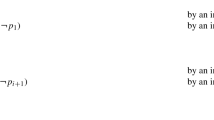Abstract
Standard Kripke models are inadequate to model situations of inexact knowledge with introspection, since positive and negative introspection force the relation of epistemic indiscernibility to be transitive and euclidean. Correlatively, Williamson’s margin for error semantics for inexact knowledge invalidates axioms 4 and 5. We present a new semantics for modal logic which is shown to be complete for K45, without constraining the accessibility relation to be transitive or euclidean. The semantics corresponds to a system of modular knowledge, in which iterated modalities and simple modalities are not on a par. We show how the semantics helps to solve Williamson’s luminosity paradox, and argue that it corresponds to an integrated model of perceptual and introspective knowledge that is psychologically more plausible than the one defended by Williamson. We formulate a generalized version of the semantics, called token semantics, in which modalities are iteration-sensitive up to degree n and insensitive beyond n. The multi-agent version of the semantics yields a resource-sensitive logic with implications for the representation of common knowledge in situations of bounded rationality.
Similar content being viewed by others
References
Blackburn, P., de Rijke M., & Venema, Y. (1999). Modal Logic. Cambridge tracts in theoretical computer science 53, Cambridge University Press.
Bonnay, D., & Égré, P.: A non-standard semantics for inexact knowledge with introspection. In R. Parikh & S. Artemov (Eds.), Proceedings of the ESSLLI 2006 workshop rationality and knowledge.
Bonnay, D., & Égré, P. (2007). Vagueness and introspection. Prague Colloquium on Reasoning about Vagueness and Probability, manuscript, IJN.
Bonnay, D., & Égré, P. (2008) Margins for error in context. In M. Garcia-Carpintero & M. Këlbel (Eds.), Relative Truth (pp. 103–107). Oxford: Oxford UP.
van Ditmarsch, H., van der Hoek, W., & Kooi, B. (2003). Lecture Notes on Dynamic Epistemic Logic, ESSLLI 2003, Vienna also available as Dynamic Epistemic Logic, Synthese Library, (Vol. 337). Springer, 2007.
Dokic, J., & Égré, P. (2008). Margin for error and the transparency of knowledge. Synthese doi:10.1007/s11229-007-9245-y.
Égré, P. (2008). Reliability, margin for error and self-knowledge. In D. Pritchard & V. Hendricks (Eds.), New waves in epistemology (pp. 215–250). Palgrave Macmillan.
Fagin, R., Halpern, J., Moses, Y., & Vardi, M. (1995). Reasoning about knowledge. Cambridge, MA: MIT Press.
Gabbay, D. (2002). A theory of hypermodal logics: Mode shifting in modal logic. Journal of Philosophical Logic, 31, 211–243.
Halpern, J. (2004). Intransitivity and vagueness. In Proceedings of the ninth international conference on principles of knowledge representation and reasoning (KR 2004) (pp. 121–129).
Kamp, H. (1971). Formal properties of “Now”. Theoria, 37, 227–273.
Mongin, P. (2002). “Modèles d’Information et Théorie de la Connaissance”. Course Notes, Ecole Polytechnique, Feb. 2002, Laboratoire d’Econométrie.
Osborne, M. J., & Rubinstein, A. (1994). A course in game theory. Cambridge, MA: MIT Press.
Rubinstein, A. (1989). The electronic mail game: Strategic behavior under ‘almost common knowledge’. American Economic Review, 79, 385–391.
Williamson, T. (1992). Inexact knowledge. Mind, 101, 217–242.
Williamson, T. (1992). An alternative rule of disjunction in modal logic. Notre Dame Journal of Formal Logic, 33(1), 89–100.
Williamson, T. (1994). Vagueness. London: Routledge.
Williamson, T. (2000). Knowledge and its limits. Oxford: Oxford University Press.
Author information
Authors and Affiliations
Corresponding authors
Rights and permissions
About this article
Cite this article
Bonnay, D., Égré, P. Inexact Knowledge with Introspection. J Philos Logic 38, 179–227 (2009). https://doi.org/10.1007/s10992-008-9087-1
Received:
Accepted:
Published:
Issue Date:
DOI: https://doi.org/10.1007/s10992-008-9087-1



